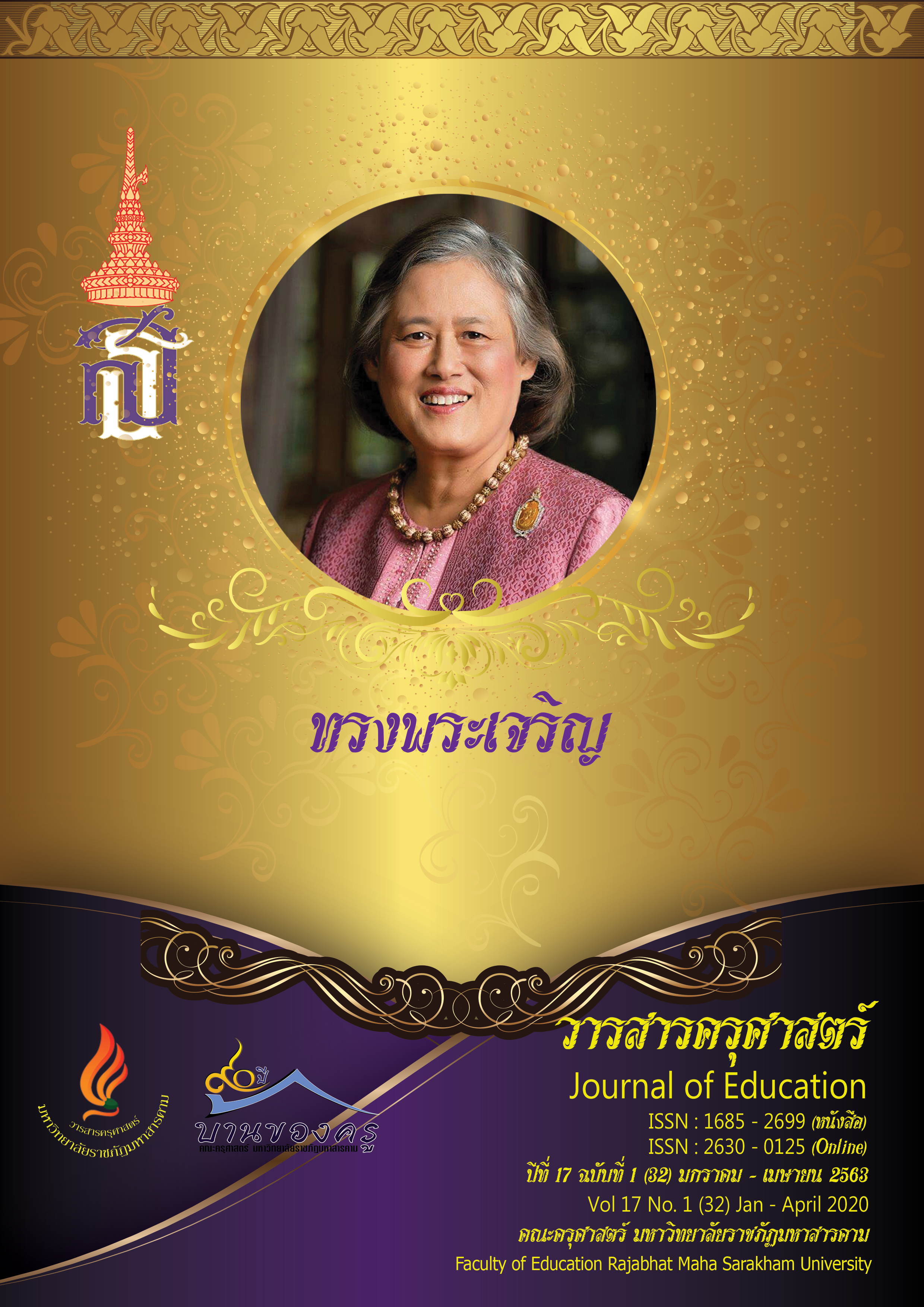Model of Effective Activities Development and Learner Development Deviled from Economic Sufficiency Philosophy in Small Schools under the Office of Kalasin Primary Educational Service Area
Main Article Content
Abstract
The purposes of this research were: 1. to study the conditions of organizing activities,
2. to create a development model for effective activities development, and 3. to study the results
of the experiment using a development model of effective development activities for learners
derived from principles of Economic Sufficiency Philosophy of in small schools under the Office of
Kalasin Primary Educational Service Area. The research instruments were a questionnaire and an
evaluation. Data analysis of qualitative and quantitative using basic statistics such as mean and
standard deviation.
The research revealed that 1) the results of the study of the condition of organizing activities
according to the opinions of teachers, school administrators, and the school’s commission of
basic education. The overall evaluation results were at the highest level, 2) The results of the model
creation found that the effective development activities had an overall image of suitability and
possibilities at a high level, and 3) effect of activities development implemented found that the
model manual had an overall at a high level, the evaluation of model found that after the development
overall was at a high level, and the results of behavior evaluation and effective learner
development activities were found that overall at a very good level.
Article Details
ข้อกำหนดเบื้องต้นที่ผู้นิพนธ์(ผู้ส่งบทความ) ควรทราบ
1. ผู้นิพนธ์ที่ประสงค์จะลงตีพิมพ์บทความกับวารสาร ตั้งแต่เดือนมกราคม 2563 เป็นต้นไป ให้ใช้รูปแบบใหม่ (Template 2563) โดยสามารถดูตัวอย่างได้ที่เมนู GUIDELINES
2. จะตีพิมพ์และเผยแพร่ได้ ต้องผ่านการประเมินจากผู้ทรงคุณวุฒิ (Peer Review)
3. การประเมินบทความโดยผู้ทรงคุณวุฒิ (Peer Review) เป็นแบบ Double Blind
4. การอ้างอิงบทความใช้หลักเกณฑ์ APA (American Psychological Association) คลิก
5. บทความถูกปฏิเสธการตีพิมพ์ ไม่ผ่านการประเมิน ผู้นิพนธ์ขอยกเลิกเองหรือชำระเงินก่อนได้รับการอนุมัติ ทางวารสารไม่มีนโยบายการคืนเงิน
References
ดารัตน์ ยินดีพบ. (2548). การสร้างชุดการสอนกิจกรรมแนะแนวเพื่อพัฒนาคุณธรรมและจริยธรรมของนักเรียน ช่วงชั้นที่ 2. กรุงเทพมหานคร: สารนิพนธ์การศึกษามหาบัณฑิต มหาวิทยาลัยศรีนครินทรวิโรฒ.
บุญเรือง กันกรด และคณะ. (2556). รูปแบบการบริหารกิจกรรมจิตสาธารณะในโรงเรียนเขตพื้นที่การศึกษามัธยมศึกษา. วารสารศึกษาศาสตร์มหาวิทยาลัยนเรศวร, 15(5), 103-112.
ปรียานุช พิบูลสราวุธ. (2549). เศรษฐกิจเศรษฐกิจพอเพียงและการประยุกต์ใช้ด้านการศึกษา. กรุงเทพมหานคร:สำนักงานทรัพย์สินส่วนพระองค์.
พนม พงษ์ไพบูลย์ และคณะ. (2546). รวบรวมกฎหมายการศึกษาเข้าสู่โครงสร้างใหม่. กรุงเทพมหานคร:วัฒนาพานิช จำกัด.
พวงรัตน์ ทวีรัตน์. (2543). วิธีการวิจัยทางพฤติกรรมศาสตร์และสังคมศาสตร์ (ฉบับปรับปรุงใหม่) (พิมพ์ครั้งที่ 8).กรุงเทพมหานคร: จุฬาลงกรณ์มหาวิทยาลัย.
ศรายุทธ ภูถาวร. (2557). สภาพและปัญหาของระบบการดูแลช่วยเหลือนักเรียนโรงเรียนทวีธาภิเศกบางขุนเทียนสังกัดสำนักงานเขตพื้นที่การศึกษามัธยมศึกษาเขต 1 (วิทยานิพนธ์ปริญญาครุศาสตรมหาบัณฑิต).มหาวิทยาลัยราชภัฏบ้านสมเด็จเจ้าพระยา, กรุงเทพมหานคร.
สถาบันวิจัยและพัฒนามหาวิทยาลัยสุโขทัยธรรมาธิราช. (2555). เอกสารการเรียนรู้การทำวิจัยด้วยตนเอง.กรุงเทพมหานคร: โรงพิมพ์มหาวิทยาลัยสุโขทัยธรรมาธิราช.
สำนักงานคณะกรรมการสถานศึกษาขั้นพื้นฐาน. (2551). แนวทางการดำเนินระบบการดูแลช่วยเหลือนักเรียนสำหรับโรงเรียนขนาดเล็ก. กรุงเทพมหานคร: โรงพิมพ์ชุมนุมสหกรณ์การเกษตรแห่งประเทศไทย จำกัด.
สำนักงานคณะกรรมการพัฒนาการเศรษฐกิจและสังคมแห่งชาติ. (2550). การประยุกต์ใช้หลักเศรษฐกิจพอเพียง.สำนักงานคณะกรรมการพัฒนาการเศรษฐกิจและสังคมแห่งชาติ (พิมพ์ครั้งที่ 1). กรุงเทพมหานคร:สำนักงานคณะกรรมการพัฒนาการเศรษฐกิจและสังคมแห่งชาติ.
สุพรรณี บุญจูง. (2558). สภาพการบริหารงานกิจกรรมเพื่อสังคมและสาธารณประโยชน์ของสถานศึกษาสังกัดสำนักงานเขตพื้นที่ การศึกษาประถมศึกษาอุบลราชธานี เขต 2. วารสารบัณฑิตวิทยาลัยพิชญทรรศน์,10(2), 105-115.
อณัญญา เรืองวานิช. (2557). แนวทางการบริหารงานกิจการนักเรียนของโรงเรียนนนทบุรีพิทยาคมสังกัดสำนักงานเขตพื้นที่การศึกษามัธยมศึกษา เขต 3. วารสารวิชาการเครือข่ายบัณฑิตศึกษามหาวิทยาลัยราชภัฏภาคเหนือ, 4(7), 101-116.


